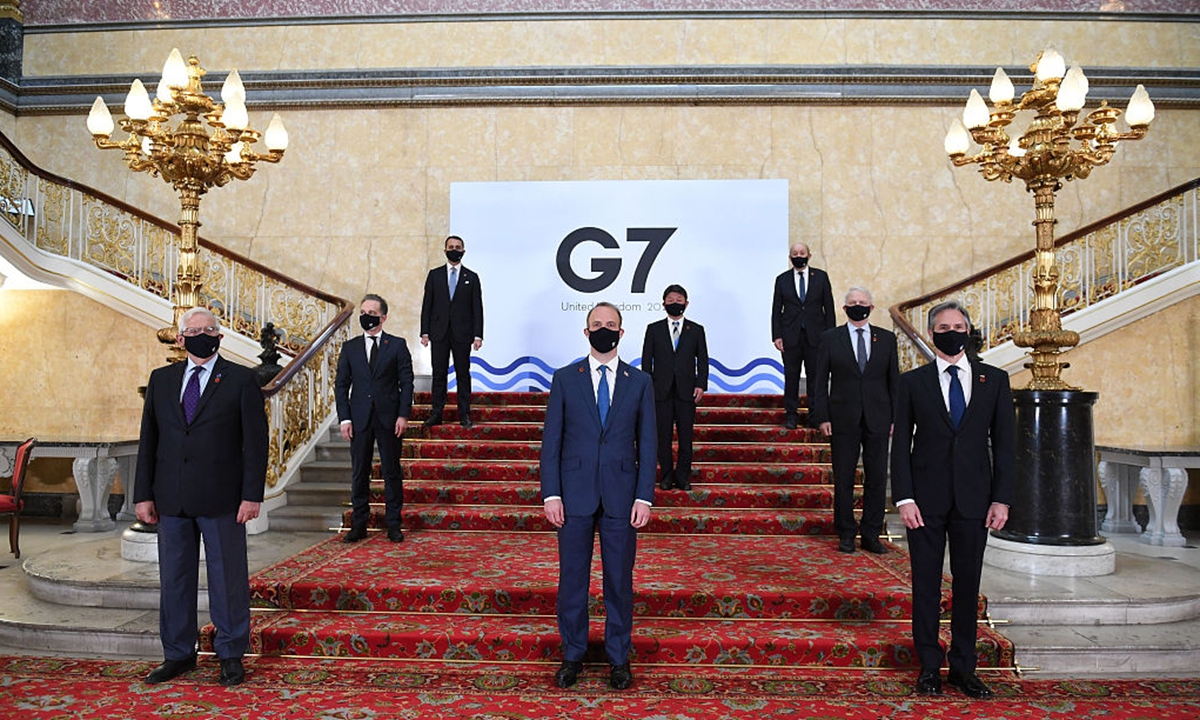
G7 Photo: VCG
What happened in Afghanistan last month has twice shocked the world - the Taliban's rapid victory and takeover of Afghanistan, and the US' chaotic withdrawal from the country.
Both events have proved the failure of the US. The country could no longer afford the war in Afghanistan and had no choice but make peace with the Taliban. This has kicked off unimaginable dominoes. The US' final withdrawal would have been an even greater calamity had the Taliban not kept their word.
The decline of the US-led alliance is not a new topic. Following the 2008 global financial crisis, Brexit, Donald Trump's election as president, and Biden's withdrawal from Afghanistan, the West has shown one thing in common: It is ready to abdicate responsibility. What has happened in Afghanistan reinforces it.
The UK has turned its back on a troubled EU to fend for itself. Trump has turned its back on the world by quitting international groups to shore up his "America First," or even "US only." US President Joe Biden has categorically abandoned Afghanistan by insisting on the withdrawal.
Even amid the COVID-19 pandemic outbreak, the West scrambled for anti-epidemic materials around the world in the early stage by making use of their financial advantages. Later they rushed to stockpile vaccines. Some of them were found to have illegally intercepted masks that were planned to be transported to third countries. Canada ordered vaccines for more than twice its population. Now the West has begun to promote a third dose of vaccine despite the protests of the WHO. However, only around 3 percent of Africa's population is fully vaccinated.
During its decline, the US-led alliance has worried the world by abdicating its responsibility. More importantly, it has also been unwilling to share power with the vast number of developing countries. This is utter selfishness. More than that, it has even clamped down on high-performing emerging countries.
China's Huawei is a typical example of this. The US government has cracked down on Huawei baselessly. This seriously violates the principles of market and rule of law broadly advocated by the West.
The US' crackdown on Huawei is an assault on China's tech industry. Its attempt to lure and divide developing countries while playing geopolitical game with China has destabilized the world order and also endangered world peace. For example, the world has seen the US actively involved in the South China Sea. It has courted China's neighboring countries, but everyone knows that US' move is only to serve its own interests. It will abandon the region if needed, just as it did in Afghanistan.
The current West-dominated international order is unsustainable with the West's continuing move of shifting responsibility. It is refusing to share power with developing countries.
For that, the world needs to make some preparations.
The first thing for the developing countries is to give up the illusion of the West. They need to develop and improve the ability to solve problems on their own. Third world countries have rich natural resources, young populations and abundant labor forces. It is entirely possible for them to create a new economic miracle as long as they find a development path suitable for their own conditions.
China faced enormous difficulties at the beginning of reform and opening-up - backward economy, huge population and a planned economy. But it became the world's second largest economy in just four decades through peaceful development. If China can do it, other countries can do it as well.
Second, the developing countries need to join hands to cope with the challenges brought by the decline of the West. They need to urge the West to stop shifting responsibility, refusing to share power, and destroying the unity of developing countries. Only in this way can the world effectively transform the old international order into one that is as peaceful and secure as possible.
The author is a research fellow at the China Institute, Fudan University. opinion@globaltimes.com.cn




